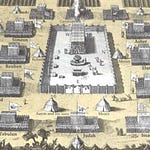We discussed how scriptures are compiled over time and how the Levites, known for their zealous and aggressive nature, were chosen for their role after the golden calf incident where they killed 3,000 people. We explored the idea that this zeal was a key factor in their selection as guardians of the temple.
Our conversation then moved to the foolishness of making idols and how this could extend to idolizing religious figures or even our own positions. We brought up Aaron's sons, Nadab and Abihu, who were killed for offering "strange fire" because they didn't follow God's rules, highlighting how rebellion often stems from apathy and a lack of fear of God.
We talked about God's desire to speak directly to humanity and how the Israelites still wanted Moses to be their intermediary. This led us to the Holy Spirit, who we believe acts as a direct teacher and guide for us today, restoring the kind of direct communication Adam had with God in the Garden of Eden. We noted that the Holy Spirit is the catalyst for seeking scriptures and understanding divine truth, unlike the "homework" style of learning we experienced in our youth. We shared personal experiences of feeling closest to God during times of suffering, driven by the Holy Spirit, rather than through routine religious practices. This hunger for God's word, we realized, doesn't come from human desire but from the Holy Spirit's prompting.
We further explored the concept of the law as an external tutor, while the indwelling Holy Spirit in every believer provides an internal revelation. This internal work allows us to examine ourselves not for sin, but to recognize Christ within us, which then causes other issues to fade away. We believe the purpose of our study is not just to gain knowledge, but to "eat of Christ and the spiritual food" and to "exhort one another while it's still called today". We discussed "solemnities," or God's appointed holy times, as moments where we are "plucked a little bit outside and see outside of time and space," receiving "enough manna to sustain us until the next time".
We affirm that God "is our salvation" in the present moment. We acknowledge the limitations of our human brains in processing concepts outside of time and space, and our inherent proneness to vanity and deception. We reflected on the cunning nature of the "serpent" and the subtle ways deception can manifest, even among those who believe in Christ. We recognized that we cannot fix ourselves through external means; rather, we rely on the Holy Spirit's revelation.
We discussed how God can reveal himself through unexpected avenues, from nature to scientific discoveries and even secular works, implying that the Holy Spirit can illuminate Christ in diverse contexts. AI, we observed, reveals the complexities and untrustworthiness of our own minds, mirroring our susceptibility to self-deception and idolatry as algorithms curate content to reinforce our desires.
We emphasized the human tendency to believe lies and the crucial role of community among believers to support each other and remain in the "Sabbath" or rest in Christ. God's appointed times provide opportunities to commune with Christ and all of those who have experienced Him throughout history. We acknowledge God's vast creation of realms, ages, and times, and His ultimate control. We believe that the continuation of the world exists due to God's mercy, hoping that everyone will come to repentance, and that for Him, time is irrelevant, as He makes and changes the rules because He is in control. When God draws us into His perspective, we confess Christ by seeing as He sees. We see the cross not as a problem, but from Christ's perspective, as we are with Him. God's nature remains unchanged—He is Sovereign, holy, and righteous—and any perceived flaws in His character are simply aspects we haven't yet understood.
We shared personal stories of recognizing God's sovereignty during times of suffering and weakness. This leads us to understand that God uses our weaknesses to demonstrate His strength, and that confessing our weaknesses is essential to seeing Christ's power. We believe it is crucial to be open to being wrong, even if it feels "devastating to the ego," within the safety of a community of Believers.
We specifically addressed the younger generation, reminding them that their existence is no accident, as God created them exactly for this time and place. We acknowledge that we cannot provide examples for navigating contemporary challenges like internet pressures or mental health struggles, as their world is vastly different from ours. The only enduring truth we can offer is to look to Christ, who has given them everything they need. We emphasized that we will also be imperfect examples, but that God can use anything to bring about transformation. We assured them that there is safety in our community, where we are rooting for them to discover God's unfailing nature and live with the joy and freedom that comes from trusting Him.
AI-generated summary from transcript.










Share this post